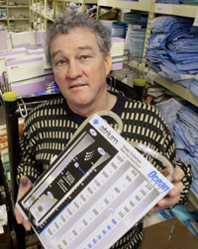 | | PAGE 1/A SECTION |
TODAY o December 28, 2000
|
 |
Group gives area hospitals' unwanted
items a new life
Saeed Ahmed - Staff
Thursday, December 28, 2000

Every year, thousands of patients throughout the developing world are forced
to forgo treatment because their hospitals can't afford the cost of the most
basic medical supplies.
And yet every year in the United States, 2,000 tons --- more than $200 million
worth --- of medical supplies go unused, only to be thrown into landfills or
incinerators.
Now, the work of an Atlanta- based nonprofit organization is helping turn this
country's waste into another's treasure.
MedShare International, which celebrates its second anniversary this month,
collects medical supplies and equipment that are still valuable but no longer
in demand at American hospitals due to over- ordering, technological change or
regulatory requirements. The organization then ships them to hospitals and
clinics in countries where they could mean the difference between life and
death for some patients.
"People are literally dying for what we throw away," says A.B. Short, who
co-founded MedShare and now serves as its executive director. "The things
that people in the U.S. take for granted --- syringes, bandages and such --- can
cost the equivalent of a month's salary for many elsewhere."
By forging partnerships with 13 Atlanta area hospitals, the organization has
shipped more than $3 million of unused supplies to 26 countries, from Rwanda
to Latvia.
It's a win-win situation, says Short.
As an example, he cites surgery packs --- a wrapped "pack" consisting of every
instrument a surgeon might need for an operation.
Surgeons rarely use more than a third or half of the items in the pack for a
particular procedure, but strict infection control regulations in the United
States require that once a pack is broken, its unused contents must be
discarded.
"Ordinarily, these items would end up in a landfill, creating, in many cases,
environmental problems of their own," Short says, "but when hospitals donate
them to MedShare, it allows the hospitals an environmentally conscious
alternative and an opportunity to help other clinics abroad provide urgently
needed care."
The seeds of MedShare were planted when Short decided to take a "sabbatical"
from 20 years of nonprofit work. He had put in five years as marketing
director of the Atlanta Community Food Bank and co- founded Cafe 458 --- a
full-service restaurant for the homeless, where diners in exchange for service
must sign a contract promising to work toward specific goals to improve their
lives.
"It was then that a friend of mine told me about the awful lot of unintentional
waste in the health care system and I began to look into ways that we could
apply the concept of a food bank to that system," Short says.
The similarities between the two enterprises were apparent, he says. Just as
well-intentioned Americans pack up food items and send them over to food
banks without realizing they may not be of use, crating up medical supplies
and simply shipping them off would accomplish little.
To avoid such shipments --- which Short dismisses --- MedShare began by
building relationships with foreign health facilities and asking them to
provide lists based on their needs, rather than having them pick items from
the organization's inventory.
"It's only human nature --- you offer somebody a list of things and it's like
Christmas," Short says, "but if they tell you what they need, then it's a much
better match for both."
Another way MedShare tries to be as effective as possible is by maintaining
ties to more than just one country. And since the levels of medical
sophistication and infrastructure vary widely in developing countries, such
ties allow it to tailor its shipments accordingly.
"Costa Rica is not Haiti," Short says. "You might have a piece of equipment that
would be a godsend for a facility in Costa Rica, but of no use whatsoever in
Haiti."
Since its inception, MedShare has operated on a shoestring budget of less than
$240,000 --- a major chunk of which goes toward leasing the
25,000-square-foot warehouse that serves as the organization's office and
storage facility.
It employs only three full-time staffers and relies heavily on volunteers to
help with the sorting and repackaging of materials that come in by the
truckloads from area hospitals.
"It goes without saying that volunteers are the lifeblood of our operations,"
Short says. "In fact, one of the reasons we haven't expanded to include
hospitals outside the Atlanta area is that we have more materials coming in
than we have volunteers to help process the items."
As it enters its third year, MedShare has thought about courting corporations
to sponsor shipments and has begun to raise funds for a biomedical workshop
that would allow it to test donated equipment like blood pressure units before
shipping them out.
"When we started out, we wanted to be the link between the abundance in this
country and those that can benefit from it," Short says, "and it's a heady
feeling to know that two years later, our mission as we envisioned it is still
pretty much on track."
|